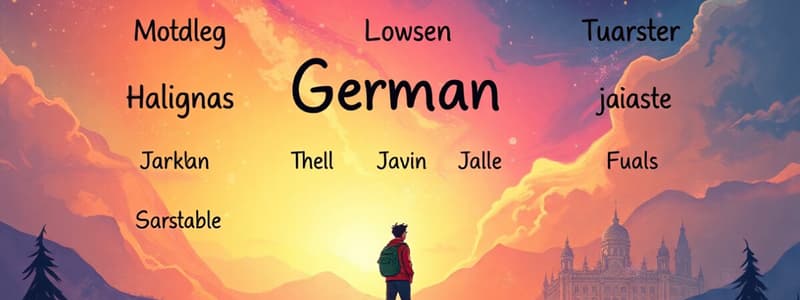Podcast
Questions and Answers
What does 'Guten Abend' mean and when is it used?
What does 'Guten Abend' mean and when is it used?
- Good evening, used after around 5:00 PM (correct)
- Good morning, used until about 10:00 AM
- Good day, used throughout the day
- Good night, used before bedtime
Which phrase would you use informally to ask a friend how they are?
Which phrase would you use informally to ask a friend how they are?
- Wie geht es Ihnen?
- Ich hoffe es geht Ihnen gut.
- Wie geht’s? (correct)
- Wie fühlen Sie sich?
Which of the following is a formal way to say goodbye?
Which of the following is a formal way to say goodbye?
- Bis bald
- Servus
- Auf Wiedersehen (correct)
- Tschüss
What is the translation of 'Gute Nacht' and when is it typically used?
What is the translation of 'Gute Nacht' and when is it typically used?
Which of the following is a polite expression used for requesting something?
Which of the following is a polite expression used for requesting something?
What is the correct way to express 'excuse me' or 'I'm sorry' in German?
What is the correct way to express 'excuse me' or 'I'm sorry' in German?
What is a common informal way to greet someone in Southern Germany?
What is a common informal way to greet someone in Southern Germany?
How is the number 'sixteen' expressed in German?
How is the number 'sixteen' expressed in German?
What is the German word for 'twenty'?
What is the German word for 'twenty'?
Which German number corresponds to the English number 'ten'?
Which German number corresponds to the English number 'ten'?
Which expression shows gratitude stronger than just 'Danke'?
Which expression shows gratitude stronger than just 'Danke'?
Which response is most appropriate when someone asks 'Wie geht es dir?' and you feel unwell?
Which response is most appropriate when someone asks 'Wie geht es dir?' and you feel unwell?
What pattern emerges in German numbers from 13 to 19?
What pattern emerges in German numbers from 13 to 19?
Which of the following German numbers requires dropping an extra letter from its base?
Which of the following German numbers requires dropping an extra letter from its base?
Which term is used as a polite response when someone thanks you in German?
Which term is used as a polite response when someone thanks you in German?
What is the German number for 'seven'?
What is the German number for 'seven'?
Which of the following days of the week is correctly paired with its German equivalent?
Which of the following days of the week is correctly paired with its German equivalent?
The term 'der Nachmittag' translates to which time of day?
The term 'der Nachmittag' translates to which time of day?
Which month is matched with its correct German translation?
Which month is matched with its correct German translation?
What is the German word for the month of September?
What is the German word for the month of September?
What is the German equivalent of the English word 'colour'?
What is the German equivalent of the English word 'colour'?
Which color is listed as 'Gold' in German?
Which color is listed as 'Gold' in German?
What is the correct German phrase for 'What time is it?'
What is the correct German phrase for 'What time is it?'
Which of the following is the German word for 'spring'?
Which of the following is the German word for 'spring'?
Which of the following pairs the correct color in English with its German translation?
Which of the following pairs the correct color in English with its German translation?
What is the German term for 'the weekend'?
What is the German term for 'the weekend'?
How is the number 45 expressed in German?
How is the number 45 expressed in German?
What is the German way to say the number 76?
What is the German way to say the number 76?
What phrase conveys the idea of 20 minutes past 3 in German?
What phrase conveys the idea of 20 minutes past 3 in German?
Which number is represented by 'zweitausend' in German?
Which number is represented by 'zweitausend' in German?
How would you say the time 5 minutes to 7 o'clock in German?
How would you say the time 5 minutes to 7 o'clock in German?
Which statement correctly expresses the number 32 in German?
Which statement correctly expresses the number 32 in German?
What does 'eintausendfünfhundert' mean in English?
What does 'eintausendfünfhundert' mean in English?
What is the correct way to express the time as 6:30 in German?
What is the correct way to express the time as 6:30 in German?
How do you say 2:05 in German?
How do you say 2:05 in German?
What is the correct phrase for 3:45 in German?
What is the correct phrase for 3:45 in German?
How is 1:30 expressed in German?
How is 1:30 expressed in German?
What is the German translation for noon?
What is the German translation for noon?
Which expression indicates 16:00 in German?
Which expression indicates 16:00 in German?
How do Germans typically ask for the time?
How do Germans typically ask for the time?
Which of the following is NOT a way to express time in German?
Which of the following is NOT a way to express time in German?
What does 'Es ist Mitternacht' mean?
What does 'Es ist Mitternacht' mean?
Flashcards are hidden until you start studying
Study Notes
Weekdays and Weekends
- The days of the week are Montag, Dienstag, Mittwoch, Donnerstag, Freitag, Samstag, and Sonntag.
- The weekend is das Wochenende.
Months
- The months of the year is der Monat.
- Some months are Januar, Februar, März, April, Mai, Juni, Juli, August, September, Oktober, November, and Dezember.
Times of Day
- The times of day are der Morgen, der Vormittag, der Mittag, der Nachmittag, der Abend, and die Nacht.
Seasons
- The seasons are der Frühling (spring), der Sommer (summer), der Herbst (autumn/fall), and der Winter (winter).
Greetings
- Hallo is an informal greeting used with friends and family.
- Guten Morgen is used in the morning until about 10:00 AM.
- Guten Tag is more formal and used from mid-morning until early evening.
- Guten Abend is used in the evening.
- Grüß dich is a common informal greeting in Southern Germany.
- Servus is a common greeting in Southern Germany and Austria.
- Tschüss is an informal goodbye used with friends and family.
- Auf Wiedersehen is formal and means "until we see each other again."
- Bis bald means "until soon" and is informal.
- Bis später is used when you expect to see the person again later.
- Bis morgen is used when you'll meet again the next day.
- Gute Nacht is used when going to bed or late at night.
Asking "How Are You?"
- Wie geht’s? is an informal greeting used with friends, family, and peers.
- Wie geht es Ihnen? is formal and used with strangers or in professional settings.
- Wie geht es dir? is used with friends, family, or peers.
- Mir geht’s gut. is a neutral response to "How are you?"
- Es geht mir gut, danke. is a polite and positive response.
- Nicht schlecht. is a neutral response.
- Mir geht’s nicht so gut. is a response if you're feeling unwell or down.
Polite Expressions
- Bitte means "please."
- Danke means "thank you."
- Vielen Dank means "thank you very much."
- Gern geschehen means "you're welcome."
- Entschuldigung means "excuse me" or "I'm sorry."
Numbers
- Numbers 0-12 are unique and must be memorized: null, eins, zwei, drei, vier, fünf, sechs, sieben, acht, neun, zehn, elf, zwölf.
- Numbers 13-19 are formed by combining the unit with "zehn" (ten): dreizehn, vierzehn, fünfzehn, sechzehn, siebzehn, achtzehn, neunzehn.
- Tens are formed by using the word for the unit followed by "zig" (except for zwanzig): zwanzig, dreißig, vierzig, fünfzig, sechzig, siebzig, achtzig, neunzig.
- Numbers 21-99 are reversed: einundzwanzig, zweiunddreißig, fünfundvierzig, siebenundfünfzig, achtundsechzig, neunundneunzig.
- 100 is einhundert, 1000 is eintausend.
Telling Time
- The basic structure for telling time is Es ist [hour] Uhr [minutes].
- Uhr means "o'clock" or "clock" and separates the hour and minutes.
- Half past the hour is halb + the next hour: Es ist halb vier - It's 3:30 (literally "half to four").
- Quarter past the hour is Viertel nach + the hour: Es ist Viertel nach drei - It's 3:15 (literally "quarter after three").
- Quarter to the hour is Viertel vor + the hour: Es ist Viertel vor vier - It's 3:45 (literally "quarter before four").
- Es ist Mittag is noon (12:00 PM).
- Es ist Mitternacht is midnight (12:00 AM).
- To ask what time it is, one can ask "Wie spät ist es?" or "Wieviel Uhr ist es?"
Studying That Suits You
Use AI to generate personalized quizzes and flashcards to suit your learning preferences.




